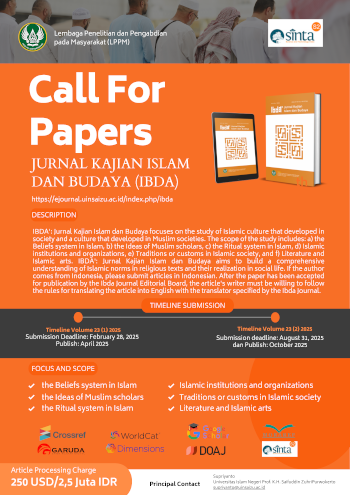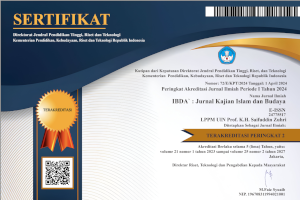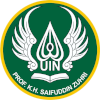Traditional Ulama', Islamic Traditions, and Ngaji Pasanan within the Networked Society
A Netnography Analysis
DOI:
https://doi.org/10.24090/ibda.v19i2.4807Kata Kunci:
Traditional Ulama’, Ngaji Pasanan, Islamic Tradition, Online MediaAbstrak
In Ramadan, kiai in various pondok pesantren (Indonesian Islamic Boarding Schools) conduct lecturing activities known as "Ngaji Pasanan". This tradition has been going on for a long time ago till today. However, since 2017 up to now, it has been seen to be held by taking advantage of digital information technology through live streaming via Facebook, YouTube or other media platforms. In 2020, online “Ngaji Pasanan†has become a trend nationwide. This study aims to reveal the context of the online “Ngaji Pasanan phenomenon, which is carried out by the ulama' in pondok pesantren, by taking two samples, namely K.H. Mustofa Bisri and K.H. Said Aqil Siradj. Data collection and analysis used a netnographic approach. This study found that: First, Ngaji Pasanan of the two traditional Ulama' who used digital media were actually conducted offline, but were mediated by the internet and broadcast online. Second, through the online “Ngaji Pasananâ€, the two traditional Ulama' not only convey the teachings in the kitab kuning but also contextualize them into socio-religious issues within the digital world, beside they also produce religious discourses and actual nationalities that are being debated by the public, whether in the online or offline context. Third, the presence of traditional Ulama' in the digital space, on the other hand, has been used by netizens to support their opinions by framing their positions on controversial religious and political issues. Fourth, the presence of traditional ulama' in the digital space is more driven by their insistence on addressing the flow of religious and national discourse in the digital space compared to their affirmation of the use of digital technology to carry out the academic tradition of pondok pesantren in Ramadan, namely "Ngaji Pasanan".Unduhan
Data unduhan belum tersedia.
Referensi
Addeo, F., Delli Paoli, A., Esposito, M., & Ylenia Bolcato, M. (2019). Doing Social Research on Online Communities: The Benefits of Netnography. ATHENS JOURNAL OF SOCIAL SCIENCES, 7(1). https://doi.org/10.30958/ajss.7-1-1
Adji, W. S., Bashith, A., Nasith, A., & Amin, S. (2019). IDENTIFICATION OF SOCIAL SYMPTOMS USING THE DRONE EMPRIT ACADEMIC AS A SUPPORT FOR STATISTICAL LITERACY. Abjadia, 4(2). https://doi.org/10.18860/abj.v4i2.8412
Agussani, A. (2020). Islamic Radical Polemics and Terrorism in Indonesia From The Perspective of Islamic Figures and Literature. IJEMS:Indonesian Journal of Education and Mathematical Science, 1(2). https://doi.org/10.30596/ijems.v1i2.4584
Alinea.id. (2018). Prabowo Subianto segera jadi warga NU. https://www.alinea.id/politik/prabowo-subianto-segera-jadi-warga-nu-b1U4d9dlx
Arianto, B. (2020). Pemanfaatan Aplikasi Drone Emprit Academic dalam Menganalisis Opini Publik di Media Sosial. Journal of Social Politics and Governance (JSPG), 2(2). https://doi.org/10.24076/jspg.2020v2i2.415
Arifin, S. (2020a). DINAMIKA ‘NGAJI ONLINEâ€TM RAMADHAN DI MASA PAGEBLUK COVID-19 PADA KOMUNITAS PESANTREN. Jurnal Kependudukan Indonesia. https://doi.org/10.14203/jki.v0i0.538
Arifin, S. (2020b). Dinamika Perubahan Relasi Kiai Santri Pada ‘Ngaji Online’ di Masa Pagebluk COVID-19. Jurnal Kependudukan Indonesia, 1.
Atran, S. (2005). The Emir : An Interview with Abu Bakar Ba’asyir, Alleged Leader of the Southeast Asian Jemaah Islamiyah Organization. Jamestown Foundation, Spotlight on Terrorism, Vol. 3(9).
BRAJKOVIČ, E. (2011). Netnography: doing ethnographic research online by Kozinets, Robert V. Social Anthropology, 19(1). https://doi.org/10.1111/j.1469-8676.2010.00142_11.x
Burhani, A. N. (2017). Geertz’s trichotomy of Abangan, Santri, and Priyayi controversy and continuity. Journal of Indonesian Islam, 11(2). https://doi.org/10.15642/JIIS.2017.11.2.329-350
Bush, R., & Fealy, G. (2014). The political decline of traditional Ulama in Indonesia: The state, Umma and Nahdlatul Ulama. Asian Journal of Social Science, 42(5). https://doi.org/10.1163/15685314-04205004
Centre, I., Violence, P., & Trends, C. T. (2018). The Terrorist Threat in Indonesia From Jemaah Islamiyah to “Islamic State.†Counter Terrorist Trends and Analyses, 10(6).
Fahmi, I. (2017). Drone Emprit: Konsep dan Teknologi. IT Camp on Big Data and Data Mining, Jakarta.
Fahmi, I. (2018). Drone Emprit (Astramaya). PT. Media Kernels Indonesia.
Fatchan, A., Amirudin, A., & Soekamto, H. (2015). Education model “bandongan†for farmers society of agricultural skills training in the background of sosioculture “pesantren†in East Java. Mediterranean Journal of Social Sciences, 6(5). https://doi.org/10.5901/mjss.2015.v6n5p515
Geertz, C. (1981). Abangan, Santri, Priyayi dalam Masyarakat Jawa, ,terj. oleh Aswab Mahasin. Pustaka Jaya.
Hefner, R. W. (2010). Expressing Islam: Religious Life and Politics in Indonesia * Edited by GREG FEALY and SALLY WHITE. Journal of Islamic Studies, 21(3). https://doi.org/10.1093/jis/etq058
Hidayah Sita. (2012). Antropologi Digital Dan Hiperteks: Sebuah Pembahasan Awal. Ranah, II(1).
Horikoshi, H. (1987). Kiai dan Perubahan Sosial. LP3ES.
Junaedi, M., Fachrurozi, A., Kusumayudha, M. R., & Gata, W. (2020). Analysis of the classification of terrorist attacks in Indonesia. JOURNAL OF INFORMATICS AND TELECOMMUNICATION ENGINEERING, 4(1). https://doi.org/10.31289/jite.v4i1.3788
Kamal, F. (2020). MODEL PEMBELAJARAN SOROGAN DAN BANDONGAN. PARAMUROBI: JURNAL PENDIDIKAN AGAMA ISLAM, 3(2). https://doi.org/10.32699/paramurobi.v3i2.1572
Lee, R. (2010). Book Review: Robert V. Kozinets Netnography: Doing Ethnographic Research Online London: SAGE, 2010. 221 pp. $44.95 (pbk). ISBN: 978-1-84860-645-6. Field Methods, 22(4). https://doi.org/10.1177/1525822X10370922
Media Indonesia. (2018). Said Aqil: Tidak Usah Didorong, Apalagi Dibayar, Warga NU Otomatis Menangkan Jokowi-Ma’ruf Amin. https://m.mediaindonesia.com/politik-dan-hukum/177653/said-aqil-tidak-usah-didorong-apalagi-dibayar-warga-nu-otomatis-menangkan-jokowi-maruf-amin
Miftahuddin, L. H. (2018). Ulama dan Media Sosial: Analisis Pesan Dakwah KH Mustofa Bisri di Twitter. MUHARRIK: Jurnal Dakwah Dan Sosial, 1(02).
Muttaqin, Z. (2020). The Ngaji Online: Transforming Islamic Learning for Moslem Communities in the Digital Age. https://doi.org/10.4108/eai.1-10-2019.2291734
News, T. (2018). Prabowo Subianto Minta Maaf ke PBNU: Saya Akan Panggil Fadli Zon, Jangan Ketus Kepada Kiyai NU. https://wartakota.tribunnews.com/2018/07/17/prabowo-subianto-minta-maaf-ke-pbnu-saya-akan-panggil-fadli-zon-jangan-ketus-kepada-kiyai-nu?page=all
Okezone News. (2018). Kagetnya Gus Mus ketika Jokowi Pilih Ma’ruf Amin sebagai Cawapres. https://news.okezone.com/read/2018/08/09/605/1934398/kagetnya-gus-mus-ketika-jokowi-pilih-ma-ruf-amin-sebagai-cawapres
Pettit, R. (2010). Digital Anthropology: How Ethnography Can Improve Online Research. Journal of Advertising Research, 50(3). https://doi.org/10.2501/S0021849910091403
Pribadi, Y. (2014). Religious networks in Madura pesantren, Nahdlatul Ulama and Kiai as the core of santri culture. Al-Jami’ah, 51(1). https://doi.org/10.14421/ajis.2013.511.1-32
Rahmanto, D. N., Meliala, A. E., & Andi Lolo, F. (2020). Foreign Terrorist Fighters Indonesia: Belief in A Just World and Terrorism. Technium Social Sciences Journal, 9. https://doi.org/10.47577/tssj.v9i1.986
Republika. (2018). Said Aqil: Nasionalis dan Ulama Harus Bersatu demi NKRI. https://nasional.republika.co.id/berita/pamknj409/said-aqil-nasionalis-dan-ulama-harus-bersatu-demi-nkri
Ricci, R. (2020). Reading between the Lines A World of Interlinear Translation. In Journal of World Literature (Vol. 1, Issue 1). https://doi.org/10.1163/24056480-00101008
Robert V. Kozinets, N. (2009). Doing Ethnographic Research Online. Sage.
SALIM, I. (2012). TRADISI PENULISAN HASYIYAH DI DUNIA ISLAM. ALQALAM, 29(2). https://doi.org/10.32678/alqalam.v29i2.870
Sauri, S., Rahmat, A. S., Nursyamsiah, N., & Nursaidah, L. L. (2016). Explaining the values embedded in the teaching of Arabic using sorongan and bandongan methods in Indonesian Traditional Muslim Boarding Schools-Pesantren. Man in India, 96(8).
Sobirin, M., Muhammad, H., & Zuhri, M. (2020). Peace Building Activism of Millennial Santri Communities through Social Media: A Nethnography Study. https://doi.org/10.4108/eai.1-10-2019.2291669
Steketee, M., Miyaoka, A., & Spiegelman, M. (2015). Social Network Analysis. In International Encyclopedia of the Social & Behavioral Sciences: Second Edition. https://doi.org/10.1016/B978-0-08-097086-8.10563-X
Suharso, P. (2019). Pemanfaatan Drone Emprit dalam Melihat Trend Perkembangan Bacaan Digital melalui Akun Twitter. Anuva, 3(4).
Thoriqussu’ud, M. (2012). Model-Model Pengembangan Kajian Kitab Kuning Di Pondok Pesantren. At-Tajdid : Jurnal Ilmu Tarbiyah, 1(2), 225–239. http://ejournal.stitmuh-pacitan.ac.id/index.php/attajdid/article/view/13
Triantoro, D. A. (2020). USTAZ YOUTUBE: USTAZ ABDUL SOMAD AND THE DYNAMICS OF CHANGING RELIGIOUS AUTHORITIES. Penamas, 33(2). https://doi.org/10.31330/penamas.v33i2.405
Adji, W. S., Bashith, A., Nasith, A., & Amin, S. (2019). IDENTIFICATION OF SOCIAL SYMPTOMS USING THE DRONE EMPRIT ACADEMIC AS A SUPPORT FOR STATISTICAL LITERACY. Abjadia, 4(2). https://doi.org/10.18860/abj.v4i2.8412
Agussani, A. (2020). Islamic Radical Polemics and Terrorism in Indonesia From The Perspective of Islamic Figures and Literature. IJEMS:Indonesian Journal of Education and Mathematical Science, 1(2). https://doi.org/10.30596/ijems.v1i2.4584
Alinea.id. (2018). Prabowo Subianto segera jadi warga NU. https://www.alinea.id/politik/prabowo-subianto-segera-jadi-warga-nu-b1U4d9dlx
Arianto, B. (2020). Pemanfaatan Aplikasi Drone Emprit Academic dalam Menganalisis Opini Publik di Media Sosial. Journal of Social Politics and Governance (JSPG), 2(2). https://doi.org/10.24076/jspg.2020v2i2.415
Arifin, S. (2020a). DINAMIKA ‘NGAJI ONLINEâ€TM RAMADHAN DI MASA PAGEBLUK COVID-19 PADA KOMUNITAS PESANTREN. Jurnal Kependudukan Indonesia. https://doi.org/10.14203/jki.v0i0.538
Arifin, S. (2020b). Dinamika Perubahan Relasi Kiai Santri Pada ‘Ngaji Online’ di Masa Pagebluk COVID-19. Jurnal Kependudukan Indonesia, 1.
Atran, S. (2005). The Emir : An Interview with Abu Bakar Ba’asyir, Alleged Leader of the Southeast Asian Jemaah Islamiyah Organization. Jamestown Foundation, Spotlight on Terrorism, Vol. 3(9).
BRAJKOVIČ, E. (2011). Netnography: doing ethnographic research online by Kozinets, Robert V. Social Anthropology, 19(1). https://doi.org/10.1111/j.1469-8676.2010.00142_11.x
Burhani, A. N. (2017). Geertz’s trichotomy of Abangan, Santri, and Priyayi controversy and continuity. Journal of Indonesian Islam, 11(2). https://doi.org/10.15642/JIIS.2017.11.2.329-350
Bush, R., & Fealy, G. (2014). The political decline of traditional Ulama in Indonesia: The state, Umma and Nahdlatul Ulama. Asian Journal of Social Science, 42(5). https://doi.org/10.1163/15685314-04205004
Centre, I., Violence, P., & Trends, C. T. (2018). The Terrorist Threat in Indonesia From Jemaah Islamiyah to “Islamic State.†Counter Terrorist Trends and Analyses, 10(6).
Fahmi, I. (2017). Drone Emprit: Konsep dan Teknologi. IT Camp on Big Data and Data Mining, Jakarta.
Fahmi, I. (2018). Drone Emprit (Astramaya). PT. Media Kernels Indonesia.
Fatchan, A., Amirudin, A., & Soekamto, H. (2015). Education model “bandongan†for farmers society of agricultural skills training in the background of sosioculture “pesantren†in East Java. Mediterranean Journal of Social Sciences, 6(5). https://doi.org/10.5901/mjss.2015.v6n5p515
Geertz, C. (1981). Abangan, Santri, Priyayi dalam Masyarakat Jawa, ,terj. oleh Aswab Mahasin. Pustaka Jaya.
Hefner, R. W. (2010). Expressing Islam: Religious Life and Politics in Indonesia * Edited by GREG FEALY and SALLY WHITE. Journal of Islamic Studies, 21(3). https://doi.org/10.1093/jis/etq058
Hidayah Sita. (2012). Antropologi Digital Dan Hiperteks: Sebuah Pembahasan Awal. Ranah, II(1).
Horikoshi, H. (1987). Kiai dan Perubahan Sosial. LP3ES.
Junaedi, M., Fachrurozi, A., Kusumayudha, M. R., & Gata, W. (2020). Analysis of the classification of terrorist attacks in Indonesia. JOURNAL OF INFORMATICS AND TELECOMMUNICATION ENGINEERING, 4(1). https://doi.org/10.31289/jite.v4i1.3788
Kamal, F. (2020). MODEL PEMBELAJARAN SOROGAN DAN BANDONGAN. PARAMUROBI: JURNAL PENDIDIKAN AGAMA ISLAM, 3(2). https://doi.org/10.32699/paramurobi.v3i2.1572
Lee, R. (2010). Book Review: Robert V. Kozinets Netnography: Doing Ethnographic Research Online London: SAGE, 2010. 221 pp. $44.95 (pbk). ISBN: 978-1-84860-645-6. Field Methods, 22(4). https://doi.org/10.1177/1525822X10370922
Media Indonesia. (2018). Said Aqil: Tidak Usah Didorong, Apalagi Dibayar, Warga NU Otomatis Menangkan Jokowi-Ma’ruf Amin. https://m.mediaindonesia.com/politik-dan-hukum/177653/said-aqil-tidak-usah-didorong-apalagi-dibayar-warga-nu-otomatis-menangkan-jokowi-maruf-amin
Miftahuddin, L. H. (2018). Ulama dan Media Sosial: Analisis Pesan Dakwah KH Mustofa Bisri di Twitter. MUHARRIK: Jurnal Dakwah Dan Sosial, 1(02).
Muttaqin, Z. (2020). The Ngaji Online: Transforming Islamic Learning for Moslem Communities in the Digital Age. https://doi.org/10.4108/eai.1-10-2019.2291734
News, T. (2018). Prabowo Subianto Minta Maaf ke PBNU: Saya Akan Panggil Fadli Zon, Jangan Ketus Kepada Kiyai NU. https://wartakota.tribunnews.com/2018/07/17/prabowo-subianto-minta-maaf-ke-pbnu-saya-akan-panggil-fadli-zon-jangan-ketus-kepada-kiyai-nu?page=all
Okezone News. (2018). Kagetnya Gus Mus ketika Jokowi Pilih Ma’ruf Amin sebagai Cawapres. https://news.okezone.com/read/2018/08/09/605/1934398/kagetnya-gus-mus-ketika-jokowi-pilih-ma-ruf-amin-sebagai-cawapres
Pettit, R. (2010). Digital Anthropology: How Ethnography Can Improve Online Research. Journal of Advertising Research, 50(3). https://doi.org/10.2501/S0021849910091403
Pribadi, Y. (2014). Religious networks in Madura pesantren, Nahdlatul Ulama and Kiai as the core of santri culture. Al-Jami’ah, 51(1). https://doi.org/10.14421/ajis.2013.511.1-32
Rahmanto, D. N., Meliala, A. E., & Andi Lolo, F. (2020). Foreign Terrorist Fighters Indonesia: Belief in A Just World and Terrorism. Technium Social Sciences Journal, 9. https://doi.org/10.47577/tssj.v9i1.986
Republika. (2018). Said Aqil: Nasionalis dan Ulama Harus Bersatu demi NKRI. https://nasional.republika.co.id/berita/pamknj409/said-aqil-nasionalis-dan-ulama-harus-bersatu-demi-nkri
Ricci, R. (2020). Reading between the Lines A World of Interlinear Translation. In Journal of World Literature (Vol. 1, Issue 1). https://doi.org/10.1163/24056480-00101008
Robert V. Kozinets, N. (2009). Doing Ethnographic Research Online. Sage.
SALIM, I. (2012). TRADISI PENULISAN HASYIYAH DI DUNIA ISLAM. ALQALAM, 29(2). https://doi.org/10.32678/alqalam.v29i2.870
Sauri, S., Rahmat, A. S., Nursyamsiah, N., & Nursaidah, L. L. (2016). Explaining the values embedded in the teaching of Arabic using sorongan and bandongan methods in Indonesian Traditional Muslim Boarding Schools-Pesantren. Man in India, 96(8).
Sobirin, M., Muhammad, H., & Zuhri, M. (2020). Peace Building Activism of Millennial Santri Communities through Social Media: A Nethnography Study. https://doi.org/10.4108/eai.1-10-2019.2291669
Steketee, M., Miyaoka, A., & Spiegelman, M. (2015). Social Network Analysis. In International Encyclopedia of the Social & Behavioral Sciences: Second Edition. https://doi.org/10.1016/B978-0-08-097086-8.10563-X
Suharso, P. (2019). Pemanfaatan Drone Emprit dalam Melihat Trend Perkembangan Bacaan Digital melalui Akun Twitter. Anuva, 3(4).
Thoriqussu’ud, M. (2012). Model-Model Pengembangan Kajian Kitab Kuning Di Pondok Pesantren. At-Tajdid : Jurnal Ilmu Tarbiyah, 1(2), 225–239. http://ejournal.stitmuh-pacitan.ac.id/index.php/attajdid/article/view/13
Triantoro, D. A. (2020). USTAZ YOUTUBE: USTAZ ABDUL SOMAD AND THE DYNAMICS OF CHANGING RELIGIOUS AUTHORITIES. Penamas, 33(2). https://doi.org/10.31330/penamas.v33i2.405
Unduhan
Diterbitkan
2021-09-13
Cara Mengutip
Sobirin, M. (2021). Traditional Ulama’, Islamic Traditions, and Ngaji Pasanan within the Networked Society: A Netnography Analysis. IBDA` : Jurnal Kajian Islam Dan Budaya, 19(2), 266–304. https://doi.org/10.24090/ibda.v19i2.4807
Terbitan
Bagian
Articles
Lisensi
Authors who publish with this journal agree to the following terms:
- Authors retain copyright and grant the journal right of first publication with the work simultaneously licensed under a Creative Commons Attribution-ShareAlike License a that allows others to share the work with an acknowledgement of the work's authorship and initial publication in this journal.
- Authors are able to enter into separate, additional contractual arrangements for the non-exclusive distribution of the journal's published version of the work (e.g., post it to an institutional repository or publish it in a book), with an acknowledgment of its initial publication in this journal.
- Authors are permitted and encouraged to post their work online (e.g., in institutional repositories or on their website) before and during the submission process, as it can lead to productive exchanges, as well as earlier and greater citation of published work (See The Effect of Open Access).















